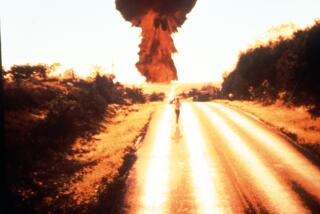Book review: ‘Mockingjay’
- Share via
Almost two years after Suzanne Collins first burst onto bestseller lists with her dystopian young-adult thriller in which 24 children are dressed up in costumes and forced to compete to the death before a television audience, the final act of the “Hunger Games” trilogy is upon us. One minute after midnight Monday, “Mockingjay” will finally be available to readers, bringing a wrenching conclusion to the tale of a country in chaos and the 17-year-old protagonist who caused it.
Fans aren’t likely to be disappointed.
Difficult as it would seem to top the ingenuity and action-packed, edge-of-your-seat storyline of “The Hunger Games,” or the continued, in-the-ring thrill ride of its follow-up, “Catching Fire,” “Mockingjay” leaves the government’s kid-on-kid hunting grounds and heads into the destitute reality of the districts, which have come under heavy fire from the Capitol for rising up against its superficial and oppressive leadership.
Opening with the dreary aftermath of “Catching Fire’s” concluding line, “Mockingjay” begins with Katniss Everdeen wandering through the wreckage of her district 12 hometown, tripping over skulls and breathing in the ashes of the incinerated bodies that used to be her neighbors. More than 90% of those neighbors are dead; the rest have been relocated to district 13, an area that was thought to be abandoned but is very much alive. Forced underground 75 years earlier in an era known as the Dark Days — an era that led to the annual children’s bloodletting known as the Hunger Games — district 13’s residents have spurred the present uprising, and they’re looking to Katniss to rile up the rest of the districts and overthrow the pale-skinned President Snow, who’s made no secret of his dislike for Katniss and her rebellious unpredictability.
Snow has captured Peeta — the boy Katniss didn’t kill in the first Hunger Games, and with whom Katniss is in love. Or is she? Like the first two books in the series, “Mockingjay” continues the love triangle between Katniss, a headstrong nihilist forced to save her country from self-inflicted annihilation; Peeta, the fresh-faced and sweet-hearted boy whom she kissed in front of the omnipresent cameras; and Gale, the hunting partner with whom she grew up who could easily become something more. It takes a while, but “Mockingjay” finally settles the question of Katniss’ true affections.
And it takes some truly surprising twists and turns to get there. Unfolding in Collins’ engaging, intelligent prose and assembled into chapters that end with didn’t-see-that-coming cliffhangers, this finale is every bit the pressure cooker of its forebears.
Where “The Hunger Games” set the stage for the unusual post-apocalyptic world in which Katniss first rose up from her inconsequential and impoverished life as an ace archer to win fame as a killer with a heart (and to become an unpredictable antihero for the masses), and “Catching Fire” uses that same stage to prime the pump for a brewing rebellion, “Mockingjay” takes readers into new territories and an even more brutal and confusing world: one where it’s unclear what sides the characters are on, one where presumed loyalties are repeatedly stood on their head.
While there’s no doubt “Mockingjay” is fictional, with its surgically altered cast of characters and a host of Armageddon-esque settings and clever gadgets that would be equally appropriate in a James Bond film, the series’ conclusion is the clearest interpretation of Collins’ inspiration for the series, which was born from channel surfing between reality TV and news coverage of the Iraq war, where the lines between young people competing for money and young people fighting in an actual war blurred in the author’s mind.
Much of the action takes place on a battlefield akin to Iraq — where innocent civilians are murdered to further a cause and each side resorts to unsavory tactics that could lead to a terrorist label. More maudlin than the first two books in the series, “Mockingjay” is also the most violent and bloody and, based on the actions and statements of its characters, its most overtly antiwar — though not so much that it distracts from a series conclusion that is nearly as shocking, and certainly every bit as original and thought provoking, as “The Hunger Games.”
Wow.
susan.carpenter@latimes.com
More to Read
Sign up for our Book Club newsletter
Get the latest news, events and more from the Los Angeles Times Book Club, and help us get L.A. reading and talking.
You may occasionally receive promotional content from the Los Angeles Times.








